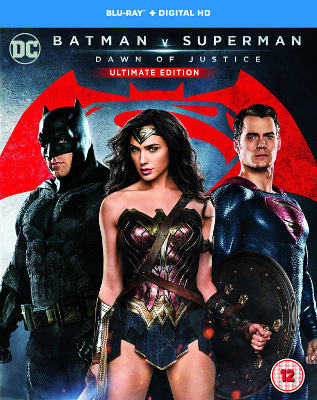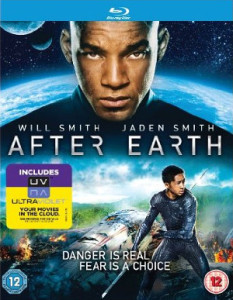 Genre: Superhero / Film
Genre: Superhero / Film
Main Cast: Henry Cavill; Ben Affleck; Amy Adams; Gal Gadot; Jesse Eisenberg; Jeremy Irons
First Shown: March, 2016
Available: Amazon.com | Amazon UK
I wasn’t that fond of Man of Steel. So when I went to the cinema recently, I walked past the staff in their superhero costumes, the table of drinks, and the balloons. Instead, I headed into Zootropolis, which was great. But there had been a bit of a mistake when the tickets were booked, which meant the manager had to handwrite tickets for a showing at a slightly different time. The cinema sent free tickets as compensation. So it’s thanks to Odeon Cinemas that I’m writing this review of Batman v Superman.
In the aftermath of Superman’s (Henry Cavill) fight with Zod, people are questioning whether Superman is a good thing for the world. Batman (Ben Affleck) has no doubt about the answer: after seeing the carnage caused by the battle, he thinks Superman has to go. But it might be that there’s something more happening than either of them realise.
One of my criticisms of Man of Steel was the amount of death that was brushed under the carpet. Epic fights happened with no attempt to move the fight away from the city. Civilians had to fend for themselves, if the film even acknowledged they existed. This film does address that. The opening scenes were the strongest on that score, as they show Bruce Wayne on the ground during the finale of the previous film. It humanises the conflict in a way Man of Steel failed to do. Some of the later scenes did not work so well, as there were a whole lot of happened-to-be-uninhabited places in two major cities. That was rather convenient and hard to believe. Though at least the heroes are now considering that civilians will die if they’re not careful.
I liked the concept behind Batman. He’s older, and twenty years as Batman has taken its toll. Wayne Manor is a ruin, so he lives in a new building on the grounds. Alfred (Jeremy Irons) is also older, and has become rather more cynical. Given how often the Batman origin story is done, it was a good choice to have an established Batman, with the issues that come with that.
Batman going darker is the main theme of his storyline. He tortures criminals for information, which fails as it’s not a reliable method. As Alfred points out, it’s Bruce Wayne who finds the information through non-violent means. The violence is a coping mechanism, not a solution. This was an interesting take on Batman, but I would have liked more on what led to this. He has flashbacks about his parents dying, but the traumatic things he would have faced after that are glossed over.
Superman’s storyline didn’t have a lot going for it. He gets very little time as Clark Kent, and Lois Lane (Amy Adams) ends up doing the reporter thing without him. There’s a lot of standing around looking sad and feeling guilty about people dying. Not a whole lot of really getting into his story, or showing his relationship with Lois developing.
The final main hero is Wonder Woman (Gal Gadot). She has a small role in this one, but it’s a good sign for her coming solo film. She has an air about her, as though she’s a lot older than she looks, which really works for the role. She also brought a bit of interest to later fight scenes, as she’s a lot more tactical with her weapons than the other two.
The villain is Lex Luthor (Jesse Eisenberg), son of the original Lex Luthor. Having him as the next generation of Luthors isn’t a bad thing, though little time is given on expanding his backstory and motivation. It wasn’t clear how the older Lex Luthor died or how else things had gone differently in this timeline. All of this would have impacted the life of the current Lex Luthor.
Unfortunately, undeveloped elements are a trend. There’s a lot of introducing characters and plot, then trying to wrap them up neatly and quickly. This doesn’t make for the best story.
Taking Wallace Keefe (Scoot McNairy), for example. He’s in a wheelchair after having both legs amputated (above the knee), due to injuries from the big attack of the previous film. He feels bitter and blames Superman. When he climbs the Superman statue to spray messages, it looks like he might get a role that goes beyond being there to pity. But he doesn’t, and that’s his last moment of agency when he’s not being manipulated. I was particularly uncomfortable with the press interview, where the camera moves to show his legs as he complains about losing everything. It’s set up in a way to point at his disability as something to pity. It would have been a lot more interesting to have his anger against Superman and the system actually come to a resolution. And as a result, for him to come to terms with what happened. But there’s no time to develop his story.
On to some of the other things going on, mental illness is handled the way superhero stories often do. Batman’s trauma is shown with empathy, even when his behaviour is going off the rails. Lex Luthor is the bad guy, which means he’s called psychotic as an insult (he doesn’t come across as actually psychotic… he also shows signs of trauma). Lex is irredeemable and mentally ill, while Batman can change and is troubled.
There’s a scene where Superman rescues a girl in Mexico. The crowd holds their hands out to touch him, as though he’s a god. Superman might be uncomfortable with this, but it still paints him as the great white saviour, worshipped by those simple non-white folk who don’t know any better.
Gotham and Metropolis were difficult to tell apart. They were also really close together. I never imagined they’d basically be districts of each other, viewable just by looking the right way. If it hadn’t been for characters saying where the action was happening, I wouldn’t have known.
There’s a lot more that could be said without needing to give away major plot twists or talk about the ending, simply because there was so much happening. It’s really the setup for multiple films.
I didn’t hate it, and I did like it better than Man of Steel. There were some themes I’d like to see explored more in sequels, like what it means to be an older Batman. There was plenty of action, and it’s likely to be enjoyable enough for superhero fans. But I didn’t love it because of the cramming issue.
When it comes down to it, I’m a lot more interested in the possible future films that will come from this. Wonder Woman is finally getting another film. After reading Cyborg’s adventures, I’m curious about how his story will be developed. Aquaman has always hit my love of ocean stories, even before Jason Momoa was cast in the part. The groundwork for the setting could lead to something great, but the filmmakers do need to slow down and tell one complete story per film, rather than trying to do everything at once.

 ** The review contains some mild spoilers, but not the major twists or ending **
** The review contains some mild spoilers, but not the major twists or ending **